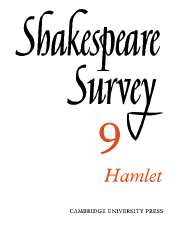Book contents
- Frontmatter
- Studies in Hamlet, 1901–1955
- English Hamlets of the Twentieth Century
- The Date of Hamlet
- Hamlet and the Court of Elsinore
- Hamlet’s ‘Sullied’ or ‘Solid’ Flesh: A Bibliographical Case–History
- Hamlet at the Globe
- Hamlet Costumes from Garrick to Gielgud
- Hamlet at the Comédie Française: 1769–1896
- The New Way with Shakespeare’s Texts: An Introduction for Lay Readers. III. In Sight of Shakespeare’s Manuscripts
- Shakespeare in the Bibliotheca Bodmeriana
- An Unpublished Contemporary Setting of a Shakespeare Song
- Garrick’s Stratford Jubilee: Reactions in France and Germany
- Shakespeare and Bohemia
- International Notes
- Shakespeare Productions in the United Kingdom: 1954
- The Tragic Curve: A Review of two Productions of Macbeth
- The Year's Contributions to Shakespearian Study 1 Critical Studies
- 2 Shakespeare’s Life, Times and Stage
- 3 Textual Studies
- Book Received
- Index
- Plate Section
An Unpublished Contemporary Setting of a Shakespeare Song
Published online by Cambridge University Press: 28 March 2007
- Frontmatter
- Studies in Hamlet, 1901–1955
- English Hamlets of the Twentieth Century
- The Date of Hamlet
- Hamlet and the Court of Elsinore
- Hamlet’s ‘Sullied’ or ‘Solid’ Flesh: A Bibliographical Case–History
- Hamlet at the Globe
- Hamlet Costumes from Garrick to Gielgud
- Hamlet at the Comédie Française: 1769–1896
- The New Way with Shakespeare’s Texts: An Introduction for Lay Readers. III. In Sight of Shakespeare’s Manuscripts
- Shakespeare in the Bibliotheca Bodmeriana
- An Unpublished Contemporary Setting of a Shakespeare Song
- Garrick’s Stratford Jubilee: Reactions in France and Germany
- Shakespeare and Bohemia
- International Notes
- Shakespeare Productions in the United Kingdom: 1954
- The Tragic Curve: A Review of two Productions of Macbeth
- The Year's Contributions to Shakespearian Study 1 Critical Studies
- 2 Shakespeare’s Life, Times and Stage
- 3 Textual Studies
- Book Received
- Index
- Plate Section
Summary
In The Winter’s Tale Autolycus, Mopsa and Dorcas sing a three-part song, beginning “Get you hence, for I must go”. The original setting for this has hitherto remained unknown, but now it is possible not only to give the music to which it was sung but also to suggest the composer and to present the words of a second verse, not reproduced in the Folio text of the play.
The setting (see Plate V) occurs in a manuscript volume, 'Songs unto the violl and lute', which was once in the possession of Stafford Smith, author of Musica Antiqua (1812). The manuscript passed into the hands of Edward Francis Rimbault, a zealous musical historian, and subsequently to the Music Division of the New York Public Library, where it is now designated manuscript Dx. 4175.1 How Stafford Smith came to miss the setting is a puzzle, for in his Musica Antiqua he printed no less than eight of the manuscript's songs, and it is strange that he did not identify the words as those in The Winter's Tale. Probably the music was composed by Robert Johnson: the manuscript, although it presents no attribution to him, gives it in close proximity to several compositions certainly or almost certainly by him—"Come away Hecket" from Middleton's The Witch, c. 1610, "Deare doe not your faire bewty wronge" from May's The Old Couple, c. 1615, "O let us howle" (xlii) from Webster's The Dutchesse of Malfy, 1613, "Tell me dearest what is love" from Beaumont and Fletcher's The Captaine, c. 1611, and "Have you seene the bright lilly growe" (xlix) from Jonson's The Divell is an Asse 1616. The fact that all these plays were produced by the King's Men, for whom Robert Johnson was busily writing in the theatre and at court between 1608 and 1617—makes it not inconceivable that the setting is Robert Johnson's
- Type
- Chapter
- Information
- Shakespeare Survey , pp. 86 - 89Publisher: Cambridge University PressPrint publication year: 1956



